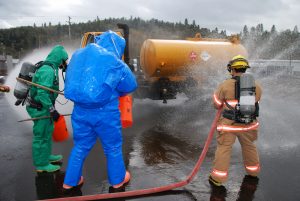On May 27, the U.S. Chemical Safety and Hazard Investigation Board (CSB) released a final report on three chemical incidents involving hydrogen fluoride (HF) at the Honeywell Performance Materials and Technologies facility in Geismar, Louisiana. The incidents occurred over a period of less than three years—from October 2021 to June 2024—and revealed systemic safety failures at the facility, according to the board.
The three incidents at the Honeywell facility included:
- A fatal HF release on October 21, 2021, during a unit startup when a corroded flange gasket catastrophically failed, spraying toxic HF on a worker’s face, ear, and neck. The worker, who wasn’t wearing adequate personal protective equipment (PPE), was transported to a hospital for treatment but died later that day. In addition to the fatality, Honeywell reported $14 million in damages.
- A reboiler exploded on January 23, 2023, releasing over 800 pounds (lb) of toxic HF and 1,600 lb of chlorine. Although no injuries occurred in the incident, the explosion caused $4 million in damage, caused a site-wide shelter-in-place order to be issued, and closed nearby highways.
- A contract worker, who wasn’t wearing face or respiratory protection, was seriously injured on June 7, 2024, during maintenance when residual toxic HF was unexpectedly released from piping, making contact with the worker’s face. The worker was transported to a local hospital, where he was admitted and spent two days recovering from his injury. He sustained second-degree burns from the HF exposure.
The CSB’s investigation found that repeated failures in Honeywell’s safety management systems, including poor hazard identification, inadequate equipment maintenance, and lapses in critical safety systems, led to the incidents.
“Not only were these three serious incidents completely unacceptable, our investigation found that they also were entirely preventable,” CSB Chairperson Steve Owens said in a board statement.
In the fatal October 2021 incident, board investigators found that Honeywell was aware in 2007 of corrosion damage to the type of gasket that failed and had documented the need to change to a different kind of gasket technology. However, Honeywell decided to replace the gaskets on an attrition basis. At the time of the incident in 2021—more than 14 years later—Honeywell still hadn’t replaced all the gaskets (including the one that failed).
In the January 2023 reboiler explosion, the CSB found that Honeywell had determined the reboiler’s shell needed to be replaced, and in February 2022, management at the facility had approved a project to replace it. However, Honeywell never funded or implemented the replacement.
In the June 2024 incident, the CSB found that neither the worker who was seriously injured nor others on-site knew the piping hadn’t been cleared of HF before maintenance work commenced.
In its final report, the CSB recommended that Honeywell strengthen its safety systems, ensure proper oversight, and fully implement recommended safety technologies and procedures to prevent future incidents at the Geismar facility.
The board also had recommendations for the Environmental Protection Agency (EPA) and the Occupational Safety and Health Administration (OSHA). It suggested that the EPA initiate a review of HF under the Toxic Substances Control Act (TSCA) to assess its potential health and environmental risks. It called on OSHA to amend its Process Safety Management (PSM) regulation to require management-of-change (MOC) reviews for organizational changes affecting process safety, including structural reorganizations, staffing changes, and policy shifts like budget cuts.
The CSB is an independent federal government board that investigates industrial chemical incidents. However, it doesn’t issue citations for regulatory violations or impose any fines. Instead, it makes safety recommendations to companies, industry groups, labor unions, and regulatory agencies, including the EPA and OSHA. The president appoints board members, who are subject to Senate confirmation.

